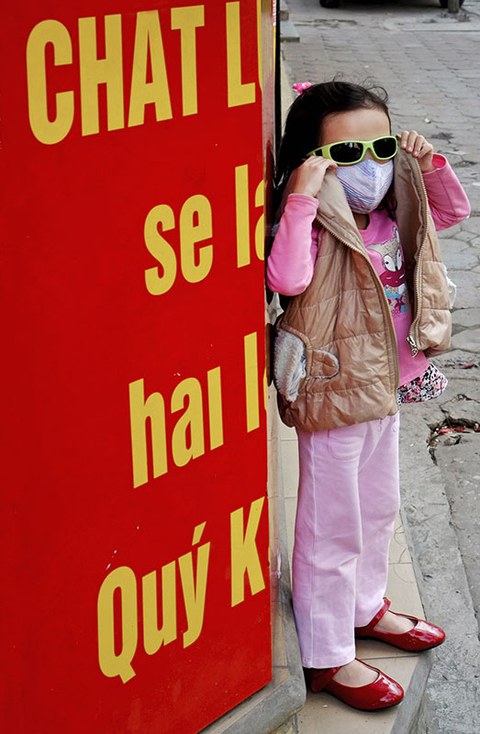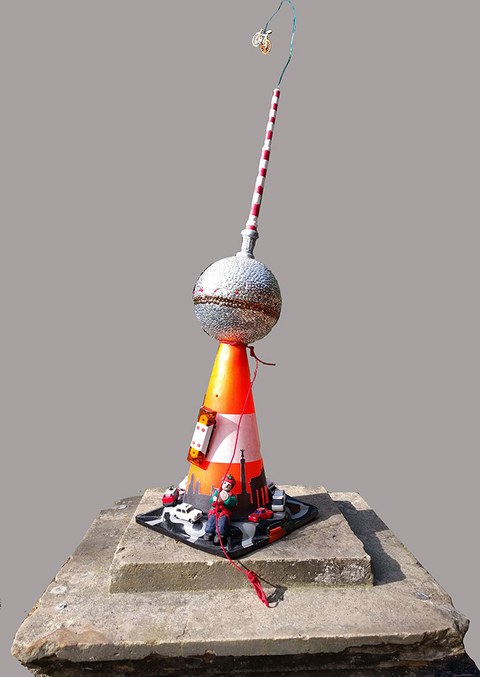"Unpopular, but more socially just": an award-winning TUD doctorate
(Interview from 2017)
Dagmar Möbius
In June 2017 in Berlin, Dr. Thilo Becker's engineering thesis was awarded the first "BUND-Forschungspreis" (Friends of the Earth Germany research prize). The thesis deals a lot with health.

Dr. Thilo Becker spent years researching air pollutants
Thilo Becker worked on his doctorate for around six years. He completed his thesis at the TU Dresden Chair of Transport Ecology in early 2016. It explored the socio-spatial distribution of traffic-related noise and air pollutants using the example of Berlin, and his supervisor was Professor Udo Becker. The doctorate was funded by a scholarship from the Heinrich Böll Foundation, and Thilo Becker was part of the interdisciplinary research training group "DIKE - Kostenwahrheit im Verkehr" (DIKE – True Costing in Transport).
"Researchers in DIKE were working on a total of five doctorates from the perspective of various different disciplines, and the team approach was crucial," says the 34-year-old. He praises this approach, telling us that "without that mutual support, I certainly wouldn't be finished yet." That is why he is supporting colleagues who had not quite finished their doctorates yet.
Did you know: Transport systems can lead to social inequality
"The few studies that had previously been conducted on this issue were usually based on small samples, and asked people about their social status and perceived noise or air pollution exposure," explains Dr. Thilo Becker. He therefore investigated the extent to which different socioeconomic groups are affected by the environmental impact of traffic and, for the first time, combined objective environmental data, economic assessments, and social statistics for a major German city. Specifically, he "built on modeled impact data for the entire city area, and thus analyzed all of Berlin." Why Berlin? One reason is that the Berlin-Brandenburg State Statistical Office was able to provide extremely detailed structured social data. "I knew the percentage of Hartz IV [unemployment] recipients and the percentage of people with an immigration background for every section of every street. To the best of my knowledge, no other city in Germany has such data," says Becker. "Additionally, the Berlin Senate Department for Urban Development and the Environment was running its own research project on environmental justice, which I was able to get involved in. The expert advice and discussion was a key factor in the success of the project. I think it's remarkable that a city government has consistently pursued such an innovative, but sometimes politically contentious, issue over multiple terms."
Findings support need for transportation transition
The comprehensive evaluation for Berlin showed that low social status is associated with higher exposure to traffic-related noise and air pollutants. A look at external costs resulting from air pollutants of 1.9 billion euros annually revealed that streets with high rates of immigration are 2.8 times more polluted than those with low immigration levels. For street noise, which leads to annual external costs of 130 million euros, the factor between low and high migration rates is 3.4. "All results are highly significant and correlate. What is more, people from socially disadvantaged backgrounds have little opportunity to escape the impact," says Dr. Thilo Becker, and sets some homework for politicians and officials at all levels of government:
- prevent the growing environmental impact on socioeconomically disadvantaged demographic groups
- reduce the existing impact so that more people can live in a healthy environment
- prioritize measures that take account of socially disadvantaged demographic groups
Dr. Thilo Becker advocates for a traffic turnaround, including so-called "push measures" that make automobile use less attractive, in addition to strong promotion of the environment. According to the Federal Environment Agency, example measures include possible higher parking fees and energy taxes, distance-based tolls, 30 km/h as the standard speed limit, and strict exhaust standards. The measures, which are not always popular, must be linked into an overall strategy with noticeable improvements in pedestrian, cycling and public transport. The transport planner is convinced: "If car traffic is reduced, society will also become more socially just." After all, less noise and air pollution particularly help disadvantaged groups. However, he knows that such theses from science cannot yet count on broad social and political support in Germany. Industry and trade unions argue that higher environmental standards, and their observance, would harm the "most vulnerable" due to higher costs. He counters: "In reality, however, these are precisely the groups that are disproportionately burdened by noise and air pollution. We know from other studies that people of lower socio-economic status contribute much less to car usage and its attendant environmental impact."
Open access publications

Second place in the Mortarboard Competition run by the TUD Graduate Academy in cooperation with SLUB.
Dr. Thilo Becker published his full theses and an abstract as open access resources. "It was the logical option for me: I received financial support from various public funds throughout my doctorate. In my view, the public therefore has a right to the findings."
About Thilo Becker
Thilo Becker studied transport engineering at TU Dresden from 2003 to 2009, specializing in traffic planning and traffic engineering. He graduated with a master's in transportation systems from KTH in Stockholm. His resume includes a number of periods working abroad, including in Kenya and Russia. From 2009 to 2017, he was involved in numerous research projects as a research associate at the Chair of Transport Ecology at TU Dresden. These included projects on cycle traffic planning, on noise and air pollutants, on free-floating carsharing, and on energy efficiency in transport.
As head of strategic traffic planning in Bremen, he has been responsible for implementation of the transportation development plan there since May 2017. "Currently, for example, we are planning a premium 40-kilometer cycle route right through the city, we are preparing projects on e-mobility and autonomous driving, and we are involved in the procurement of new streetcars."
Contact:
Dr. Thilo Becker
E-Mail
